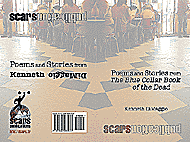



|
enjoy this Kenneth DiMaggio writing in the free cc&d Tax Day 2011 PDF file chapbook Poems and Stories from The Blue Collar Book of the Dead |
 |

|
You can also order this as a 2011 6" x 9" perfect-bound paperback ISBN# book! Click on the cover spread for the book Poems and Stories from The Blue Collar Book of the Dead |
|
![]()




